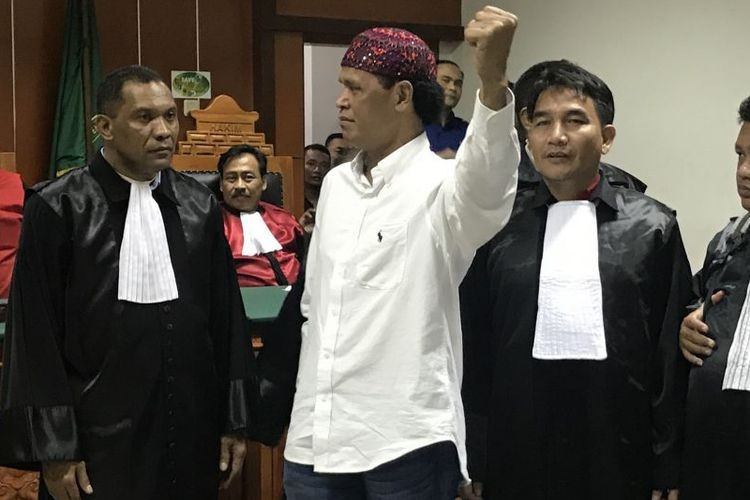News
Government reluctant to act against mass organizations
Tenggara Strategics May 9, 2025 Hercules Rozario Marshal, (center) appears in the West Jakarta District Court on Feb. 27. (kompas.com/Tatang Guritno)
Hercules Rozario Marshal, (center) appears in the West Jakarta District Court on Feb. 27. (kompas.com/Tatang Guritno)
Mass organizations have been identified as an obstacle to the investment climate in the country, as many of them often engage in thuggery, demanding illegal levies in return for security rackets. While some of the groups have proven to violate the law, it looks difficult for the law enforcers to act against them, simply because of their connection to, and hence support from, political elites, if not the military or the police top brass.
The notoriety of the mass organizations has raised fresh concerns. The deputy speaker of the People’s Consultative Assembly from the National Mandate Party (PAN), Eddy Soeparno, said recently that the construction of a plant belonging to Chinese electric vehicle manufacturer BYD in Subang, West Java, had been disrupted by acts of thuggery committed by individuals from unidentified mass organizations.
The mass organizations are not only demanding "protection" fees, but are also showing disrespect for the law enforcement agencies. This is evident in the incident in Cimanggis, Depok, West Java, on April 18, in which members of the mass organization GRIB Jaya set fire to three operational cars of the local police, who were about to arrest an individual linked to the group for alleged vandalism.
The police eventually arrested seven people, six of them members of GRIB Jaya, in connection with the arson. In response to the incident, West Java Governor Dedi Mulyadi expressed his support for the police, saying acts of thuggery should be fought for the sake of public security and ease of doing business. Earlier in March, the West Java government had formed a task force mandated to eradicate acts of thuggery in the province.
Dedi’s statement irked the chairman of GRIB Jaya, Rosario ‘’Hercules’’ de Marshall, saying he could mobilize 50,000 of his members to storm Gedung Sate, the office of the West Java governor, in Bandung. Hercules, who has been known for his close ties with Prabowo for decades, asked Dedi to embrace mass organizations, instead of treating them as enemies.
Hercules also claimed that his followers contributed to Dedi’s victory in the regional election in November last year without expecting rewards, considering that he was nominated by Prabowo’s Gerindra Party.
Both Dedi and GRIB have apparently reconciled, with the secretary general of the mass organization, Zulfikar, referring to the West Java governor as a friend, whose programs should be supported by the group.
But concerns about mass organizations as a constant threat to investment remain. Investment and Downstream Minister/National Investment Board (BKPM) head Rosan Roeslani said he has asked National Police chief Gen. Listyo Sigit Prabowo to maintain security at the BYD assembling plant and other industrial zones.
Indonesian Military (TNI) Commander Gen. Agus Subiyanto also said the armed forces are open to “educating” mass organization members in order for them to refrain from acts of thuggery.
Home Minister Tito Karnavian, who is a former police chief, has opened up the possibility of revising Law No. 17/2013 on mass organizations. Tito said the revision was pressing to strengthen oversight mechanisms of the groups.
Mass organizations represent the implementation of freedom of association and assembly, which the Constitution promotes. However, the freedom cannot justify actions such as intimidation, extortion or violence, which characterize certain mass organizations that operate like mafia gangs.
Chairman of Commission II of the House of Representatives, Rifqinizami Karsayuda, however, believes revision of the law is not urgent. The NasDem politician argues that the law already grants the government, both at the central and regional levels, the authority to evaluate and even dissolve troubling mass organizations. The government of former president Joko “Jokowi” Widodo, for example, dissolved the Hizbut Tahrir Indonesia (HTI) in 2017 and the Islam Defender Front (FPI) in 2020 for failing to conform to the state ideology Pancasila.
Mass organizations, to the extent of their law-breaking acts, have been a classic issue in Indonesia, given their significance in raising the popularity and electability of certain figures in particular areas.
The rise of mass organizations has posed a challenge for the law enforcement agencies, as in the case of the act of thuggery against a big investment like BYD. Unless the police are able to enforce the law against them, Indonesia will lose its appeal as a safe place to do business among investors.
After all, the state shall not give up to thuggery.
What we've heard
A cabinet member said the government is closely monitoring the recent turmoil involving mass organizations in various regions. He said the government would not hesitate to take firm action if the organizations broke the law. However, the government is also adopting a soft approach, such as giving them opportunities in the fields of economy and culture.

